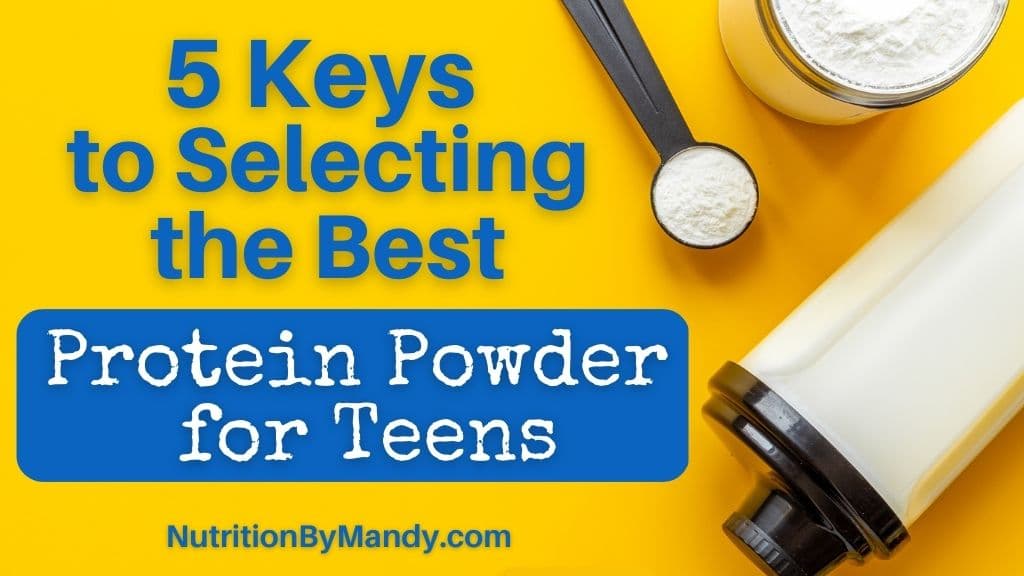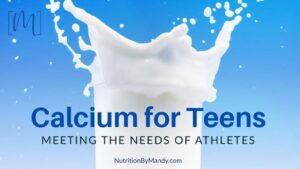Last Updated on June 25, 2025 by Mandy Tyler, M.Ed., RD, CSSD, LD
5 Keys to Selecting the Best Protein Powder for Teens
With all the different protein powders on the market, it can be difficult to know what the best protein powder for teens is.
Let’s take a look at the protein needs of teen athletes. Then we will identify 5 keys to selecting the best protein powder for teens.
What are the Protein Needs of Teen Athletes?
Before purchasing a protein powder, it is important to understand how much protein a teen athlete needs.
A key concept related to protein intake is the importance of athletes spreading their protein intake throughout the day to support muscle growth and development (1).
Research looking at adolescents, indicates that teen athletes should aim to consume ~0.3 g of protein per kg of body weight at each of several meals and snacks spread throughout the day (2).
Generally, this calculates to be in the range of ~15-25 grams of protein per meal/snack for most teenage athletes; with larger athletes needing more protein than smaller athletes.
Based on this, when preparing a protein shake for teens, it should contain a protein content within this range.
Pro Tip: Eating protein alone will not result in a teen athlete gaining muscle mass. For teen athletes to build muscle, nutrition intake must be combined with a well-planned strength and conditioning program.

How to Select the Best Protein Powder for Teens
Now that you are aware of the protein needs of teen athletes, let’s take a look at 5 keys to selecting the best protein powder for teens.
#1 Is the Protein Powder Third-Party Certified?
When looking at protein powders for teens, it is important to be aware that dietary supplements are not regulated by the Food and Drug Administration in the same way that food is.
Dietary supplements may contain banned substances that could potentially be harmful to an athlete’s health or make the athlete ineligible for competition (3).
Due to this, athletes should look for supplements that have been third-party tested.
What is Third-Party Certification?
When a supplement is third-party tested, it has been evaluated by an outside organization for accuracy of ingredients.
In addition to ingredients, the outside organization evaluates the supplement company’s manufacturing process and procedures.
Two companies that evaluate and certify sports supplements are NSF International Certified for Sport and Informed Sport.
From their websites you can search for products and supplement brands that have been tested and certified by the organization.
Selecting a Third-Party Tested Protein Powder for Teens
When recommending a protein powder to a teen athlete, I will only consider those that have been third-party tested.
While third-party testing does not guarantee a supplement’s effectiveness, it does ensure the product has been evaluated for accuracy of ingredients listed on the label.

#2 What Type of Protein is in the Powder?
After ensuring the protein powder is third-party tested, it is important to consider the type of protein in the powder and ensure it meets the dietary needs of the athlete.
For example, does the athlete follow a vegan or vegetarian diet and need a plant-based protein powder? Also consider if the teen has any allergies that impact the type of protein powder to purchase.
If the teen has a milk allergy it is important to be aware that whey and casein protein powders are both derived from milk. Thus, individuals with a milk allergy will want to select an alternate type of protein powder to use.
In addition, teen athletes with lactose intolerance will want to be diligent in determining whether or not the protein powder selected contains lactose. Often the amount of lactose within a protein powder will vary amongst brands as well as the type of product.
Similarly, teens with a soy allergy will need to avoid soy protein powders and look for added ingredients containing soy.
Pro Tip: It is important to carefully read packaging and ingredient lists to ensure the selected protein powder meets the specific dietary needs of the athlete. If the athlete has an allergy, be extra cautious to ensure an allergy-free protein powder is purchased.
#2 How Much Protein is in One Serving?
The next step in selecting the best protein powder for teens is determining how much protein is provided in one scoop of the powder.
Recognize that many protein powders, especially those advertised to build muscle mass, may contain large amounts of protein.
As discussed previously, teen athletes only need ~15-25 grams of protein in a shake. Thus, when preparing a shake, the teen may not need to include one full scoop of the protein powder.
Pro Tip: Keep in mind that if you mix the protein powder with milk or other ingredients that contain protein, the protein content of these items needs to be factored in when calculating how much protein is in your shake.

#4 Does the Protein Powder Contain Mega-Doses of Ingredients?
After determining the amount of protein in one scoop of the powder, review the label for information on the types and amounts of vitamins and minerals the product contains.
It is not uncommon to find dietary supplements, including protein powders, that contain mega-doses of vitamins and minerals.
There is not a need for a teen athlete to consume a mega-dose of any nutrient. This is particularly a concern when a teen intends to consume multiple servings of the protein powder during the day.
#5 What Ingredients are Added to the Protein Powder?
Finally, review the label to see if the protein powder contains any other added ingredients.
Some protein powders, particularly those promoting weight gain, will contain added ingredients, such as: carbohydrates, fats, branched chain amino acids, and creatine.
When selecting a protein powder, I suggest looking for one with limited added ingredients aside from the source of protein.
Teens can easily blend the powder with milk, juice, frozen fruits, nut butters, and other food ingredients to increase the carbohydrate, vitamin, and mineral content of the protein shake.
Does the Protein Powder Contain a Proprietary Blend?
Athletes should be cautious if the supplement label states the protein powder contains a “proprietary blend” of ingredients.
If the supplement has a proprietary or secret blend of ingredients, do not take the product. It is important to know the type and amount of ingredients contained in the product to determine if the supplement is appropriate to take.

Protein from Food and Beverages
Although protein powders can be a convenient way for teen athletes to meet their protein needs when time is limited, they should not take the place of real food in the diet.
There are numerous ways teens can add protein to their shakes without the use of a supplement.
Items such as Greek yogurt, high-protein milk, cottage cheese, tofu, and nut butters are all great alternatives to protein powder. Athletes can blend these ingredients into a shake to boost the drink’s protein and nutrient content.
Pro Tip: Teens need to focus on eating real food to build the foundation of their sports nutrition meal plans. The use of protein powders should be saved for those situations when time is limited and a quick option is needed.

Selecting the Best Protein Powder for Teens
You are now equipped with 5 keys to selecting the best protein powder for teens.
If you have questions regarding the use of sports supplements, seek guidance from a sports dietitian nutritionist. The sports dietitian nutritionist can evaluate the supplement and work with your teen on a plan to help meet their sports nutrition goals.
For additional sports nutrition tips for teen athletes, check out my blog: Breakfast for Teens on the Go.
Join the Nutrition By Mandy Email List & Get a Free High Calorie Smoothie Recipe
Click HERE to join the Nutrition By Mandy e-mail list. When you join you will receive a free high calorie smoothie recipe to download and enjoy.
About the Author
Mandy Tyler is a Sports Dietitian Nutritionist in the San Antonio, TX area. She is a Registered and Licensed Dietitian, a Board-Certified Specialist in Sports Dietetics, a Licensed Athletic Trainer, and is a Certified Exercise Physiologist through the American College of Sports Medicine. Mandy has experience working with athletes at the high school, collegiate, and professional levels. She believes the key to reaching one’s full potential, both in everyday life and in sports performance, relies on a healthy nutritional foundation.

If you are looking to take your performance to the next level, make sure to check out my new Sports Nutrition Game Day Guide. This downloadable guide is written to help athletes develop an individualized plan to achieve peak performance on game day.





